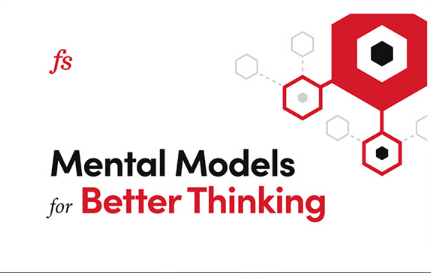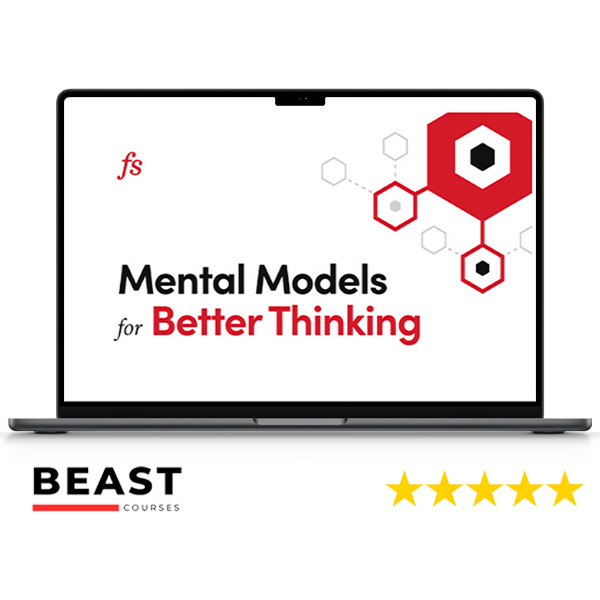Mental Models for Better Thinking – Farnam Street
Mental Models for Better Thinking – Farnam Street
Original price was: $499.00.$20.00Current price is: $20.00.
2.36 GB

After completing your purchase, you will receive a secure Mega.nz link to access your course materials. Follow these steps to access your course:
If you encounter any issues accessing the course via Mega.nz, please contact our support team, and we will provide you with an alternative Google Drive link.
Why Choose beastcourses?
- Permanent Access Links
- 24/7 Expert Support
- Instant Access to HD Quality Courses
- 100% Safe & Secure Checkout
- Courses Are Updated Regularly
Mental Models for Better Thinking – Farnam Street

Elevate Your Decision-Making with the Mental Models for Better Thinking Course
Unlock the power of cognitive tools with the Mental Models for Better Thinking course by Farnam Street. Designed to enhance your decision-making and problem-solving skills, this transformative course introduces a range of mental models that will help you interpret the world more effectively. Whether you want to improve your personal life, enhance your professional capabilities, or simply think more clearly, this course provides a diverse toolkit to help you achieve your goals. Learn how to make better decisions, reduce biases, and approach challenges from multiple perspectives with the wisdom of mental models.
Why Choose the Mental Models for Better Thinking Course?
What Are Mental Models, and Why Are They Important?
Mental models are cognitive tools that provide frameworks for understanding how the world works. They are concepts, ideas, and strategies that help you interpret information, analyze situations, and make informed decisions. In the Mental Models for Better Thinking course, you will learn how to use these models to navigate complex problems and enhance your thinking.
Mastering various mental models allows you to expand your cognitive toolkit and become a more versatile thinker. The course draws from multiple disciplines, including economics, mathematics, psychology, and physics, providing a well-rounded approach to decision-making. This diverse set of tools ensures you avoid the “man-with-a-hammer syndrome,” where you see every problem as a nail because you only have one tool. Instead, you will learn to select the appropriate model for each unique situation, increasing the likelihood of finding effective solutions.
How Does the Course Teach You to Think Better?
Farnam Street’s Mental Models for Better Thinking course emphasizes practical application and continuous improvement. You will explore a variety of mental models, each designed to help you think more clearly and make better decisions. The course introduces these models systematically, starting with foundational concepts and progressing to more complex ideas.
You will learn how to integrate these models into your daily life through interactive lessons, real-life examples, and exercises. The course also includes reflective thinking practices, such as maintaining a decision journal, where you can record the models you apply and evaluate their effectiveness. By engaging with these practices, you will develop a habit of mindful decision-making, enhancing your cognitive flexibility and problem-solving skills.
What Are the Core Mental Models You Will Learn?
How Does Economics Provide a Foundation for Better Decision-Making?
Economics offers several key mental models that improve decision-making by highlighting trade-offs and risks. In the Mental Models for Better Thinking course, you will explore concepts like ‘Opportunity Cost’ and ‘Margin of Safety.’
- Opportunity Cost: This model teaches you to consider what you are giving up whenever you choose. Understanding opportunity cost helps you evaluate the true value of your decisions by considering the next best alternative you are forgoing. This model is crucial in personal and professional life, encouraging you to weigh all possible outcomes before deciding.
- Margin of Safety: Widely used in investing, this model suggests choosing options that provide a buffer against negative outcomes. By incorporating a margin of safety into your decisions, you minimize potential downsides, ensuring you remain protected even in uncertain situations. This model is particularly valuable in risk management, helping you navigate complex environments more confidently.
How Do Mathematical Models Enhance Your Analytical Skills?
Mathematics is another discipline that offers powerful mental models to improve thinking. The course delves into models such as Probability and Non-linearity.
- Probability: This model is essential for assessing risks and making decisions under uncertainty. By understanding probability, you can better evaluate the potential outcomes of different choices and weigh them based on their likelihood. This model helps you avoid overconfidence and base your decisions on statistical reasoning rather than intuition alone.
- Non-linearity: Many real-world situations are non-linear, where changes do not happen simply, proportionally. The model of non-linearity helps you recognize these scenarios, such as exponential growth or diminishing returns. Understanding non-linearity is crucial in fields like finance, marketing, and strategic planning, where small changes can have disproportionately large effects.
How Can Psychology Models Help You Overcome Cognitive Biases?
Why Is Understanding Human Behavior Key to Better Thinking?
Psychology provides insights into human behavior and cognitive processes, offering models that help you recognize and overcome biases. In the Mental Models for Better Thinking course, you will explore psychological models such as ‘Confirmation Bias’ and ‘Inversion.’
- Confirmation Bias: This model alerts you to the tendency to favour information that supports your existing beliefs while ignoring or dismissing evidence to the contrary. Understanding confirmation bias helps you actively seek out opposing viewpoints and challenge your assumptions, leading to more balanced and objective decision-making.
- Inversion: This powerful model involves looking at problems from a different angle or considering the opposite approach. Thinking backward or asking, “What should I avoid doing?” you often reveal solutions that are not immediately obvious. Inversion is particularly useful in complex problem-solving scenarios where traditional approaches may not yield the desired results.
How Do Physics Models Provide Unique Perspectives?
Physics, often seen as a purely scientific field, offers mental models that are metaphorically applicable to social dynamics and decision-making. The course introduces concepts like ‘Critical Mass’ and ‘Equilibrium.’
- Critical Mass: This model refers to the amount of effort, resources, or energy needed to initiate a change or achieve a goal. Understanding critical mass helps you determine how much input is required to kickstart a project or reach a tipping point. This model is invaluable in strategic planning, marketing, and project management.
- Equilibrium: In physics, equilibrium is a state where opposing forces balance each other. This concept can be applied to understanding market dynamics, conflict resolution, and personal relationships. Recognizing when a situation is in equilibrium or how to restore balance when it is disrupted can help you manage complex scenarios effectively.
How Can You Integrate Mental Models into Your Everyday Life?
What Strategies Are Effective for Applying Mental Models Daily?
It is essential to practice reflective thinking and conscious application to effectively integrate mental models into your everyday life. The Mental Models for Better Thinking course provides several strategies for this.
- Decision Journal: One of the most effective tools for applying mental models is maintaining a decision journal. By recording the mental models you use and the outcomes they produce, you can gain valuable feedback on their effectiveness and identify areas for improvement. This practice encourages continuous learning and helps you refine your decision-making process over time.
- Community Engagement: Engaging with a community or network that also uses mental models can enhance your learning and application. The course encourages participation in forums and discussion groups where you can share experiences, exchange ideas, and learn from others. This collaborative approach fosters a deeper understanding of mental models and their practical use.
How Can Lifelong Learning with Mental Models Benefit You?
Mental models are not just tools for better thinking but a lifelong approach to continuous improvement. The Mental Models for Better Thinking course promotes the use of these models as part of a broader commitment to learning and growth.
As you master different mental models, you expand your cognitive toolkit, allowing you to approach problems with greater flexibility and creativity. This transformative approach enhances your thinking and ability to navigate complex situations, make informed decisions, and achieve successful outcomes in all areas of life.
Why Should You Enroll in the Mental Models for Better Thinking Course?
What Are the Benefits of Developing a Diverse Toolkit?
By enrolling in the Mental Models for Better Thinking course, you will develop a diverse toolkit of cognitive strategies that can be applied to a wide range of scenarios. This diversity prevents you from becoming overly reliant on a single approach, enabling you to adapt to new challenges and think more flexibly.
A diverse set of mental models helps you see problems from multiple perspectives, increasing your chances of finding effective solutions. Whether making business decisions, solving personal dilemmas, or navigating social dynamics, a well-rounded toolkit enhances your ability to think clearly and make sound judgments.
How Can This Course Transform Your Thinking and Decision-Making?
The Mental Models for Better Thinking course offers a structured approach to mastering mental models, providing you with the tools and techniques needed to become a better thinker. By learning to apply these models in your daily life, you will improve your problem-solving abilities, reduce cognitive biases, and make decisions with greater confidence and clarity.
This course is an investment in your personal and professional growth, equipping you with the knowledge and skills to navigate an increasingly complex world. With Farnam Street’s guidance, you will embark on a journey of lifelong learning and continuous improvement, becoming a more adept and thoughtful individual in every aspect of life.
Final Thoughts: Is the Mental Models for Better Thinking Course Right for You?
If you are looking to enhance your decision-making skills, reduce biases, and think more effectively, the Mental Models for Better Thinking course by Farnam Street is the perfect choice. With its comprehensive curriculum, practical applications, and commitment to lifelong learning, this course provides a powerful toolkit for anyone seeking to become a better thinker.
Enroll today and start your journey toward mastering the art of mental models.






